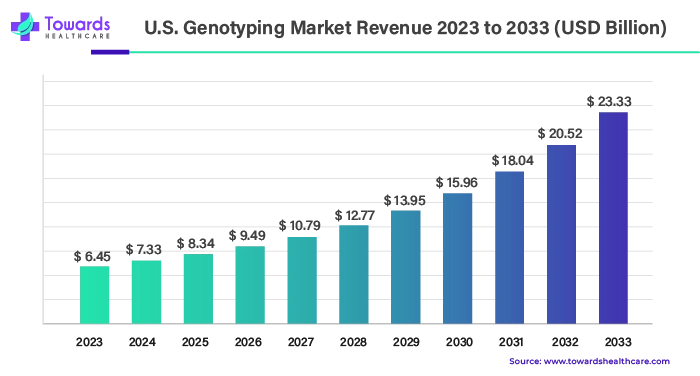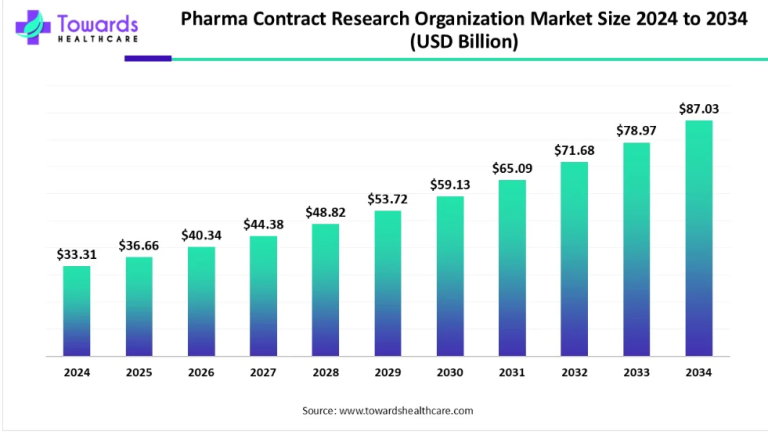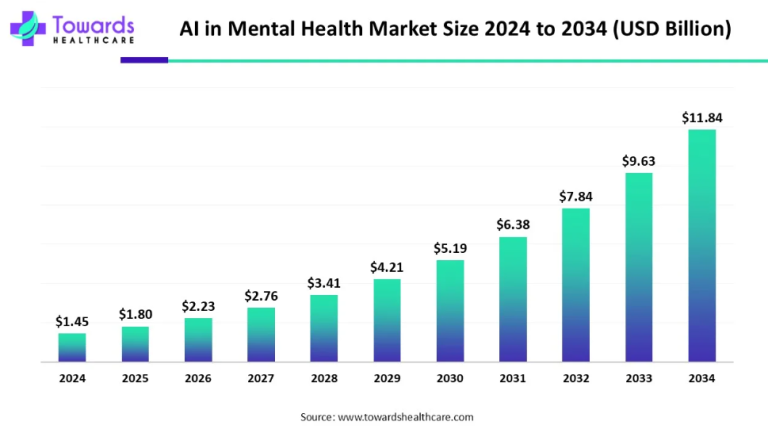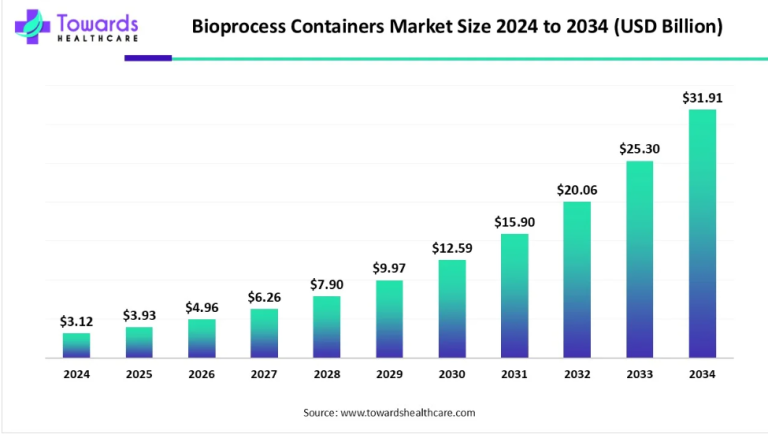
The U.S. genotyping market was valued at an impressive US$ 6.45 billion in 2023 and is projected to reach a staggering US$ 23.33 billion by the end of 2033, representing a compound annual growth rate (CAGR) of 13.72% from 2024 to 2033. This remarkable growth is driven by the increasing importance of genotyping in biotechnology and healthcare.
Genotyping is the process of determining differences in the genetic make-up (genotype) of an individual by examining the individual’s DNA sequence. This technique is crucial for a variety of applications, including disease prediction, personalized medicine, and genetic research. The rise of precision medicine, which tailors treatment based on individual genetic profiles, has significantly bolstered the demand for genotyping.
The U.S. genotyping market generates income through services such as custom genotyping, genetic counseling, genotyping assays, Sanger sequencing, fragment length analysis, and genotyping data analysis. Genotyping identifies small genetic variations that can lead to significant phenotypic changes, including anatomical differences and pathological modifications underlying diseases. This process has various applications in fundamental science, medicine, and agriculture. By comparing a DNA sequence to a reference sequence or another sample, genotyping detects minute differences in DNA sequences among populations.
Researchers use genotyping to investigate genetic variations, including major structural changes in DNA, variations in copy number, and single nucleotide patterns. Since numerous genetic targets can contribute to a particular illness, analysis requires flexibility and precision. Genotyping data analysis tools can identify sample outliers and evaluate results for millions of markers and probes, providing researchers with insights into the functional effects of genetic diversity. These factors collectively drive the growth of the U.S. genotyping market.
Download a sample of this report @ https://www.towardshealthcare.com/personalized-scope/5160
Market Drivers: Biotechnology and Healthcare
The biotechnology sector has seen rapid advancements, with genotyping playing a pivotal role. In healthcare, genotyping is used to identify genetic variations that may contribute to an individual’s risk of developing certain diseases. The ability to predict diseases and tailor treatments has fueled the adoption of genotyping technologies.
Precision Medicine
- One of the most significant drivers of the genotyping market is the growth of precision medicine. Precision medicine involves customizing healthcare, with medical decisions, treatments, practices, or products being tailored to the individual patient. By understanding the genetic basis of diseases, healthcare providers can offer more effective and targeted therapies.
Pharmacogenomics
- Pharmacogenomics is another critical area where genotyping is making substantial impacts. This field studies how genes affect a person’s response to drugs, allowing for the development of personalized medications that are more effective and have fewer side effects. The integration of pharmacogenomics into clinical practice is accelerating the demand for genotyping.
Technological Advancements in Genotyping
The genotyping market is also being propelled by continuous technological advancements. Innovations in next-generation sequencing (NGS) and microarray technologies have significantly enhanced the speed, accuracy, and affordability of genotyping.
Next-Generation Sequencing (NGS)
- NGS technologies have revolutionized the genotyping landscape by allowing for the rapid sequencing of large sections of DNA. This technology is not only faster but also more cost-effective compared to traditional sequencing methods. NGS is widely used in research and clinical applications, driving market growth.
Microarray Technology
- Microarray technology is another critical innovation that has expanded the capabilities of genotyping. This technology enables the analysis of thousands of genetic variants simultaneously, providing comprehensive genetic information quickly and efficiently. The integration of microarray technology in clinical diagnostics and research is further boosting the market.
Regulatory and Ethical Considerations
As the genotyping market grows, regulatory and ethical considerations become increasingly important. Ensuring the privacy and security of genetic data is paramount. Regulatory bodies are continually updating guidelines to keep pace with technological advancements and to protect individuals’ genetic information.
Data Privacy
- The handling of genetic data raises significant privacy concerns. Laws such as the Genetic Information Nondiscrimination Act (GINA) in the U.S. protect individuals from discrimination based on their genetic information. Companies must adhere to stringent data protection standards to ensure compliance and build trust with consumers.
Ethical Issues
- Ethical issues in genotyping include informed consent, the potential for genetic discrimination, and the psychological impact of genetic information. It is essential for companies and researchers to address these concerns transparently and ethically.
Market Challenges
Despite the promising growth, the genotyping market faces several challenges. High costs of advanced genotyping technologies, regulatory hurdles, and ethical concerns can hinder market expansion.
Cost
- The high cost of genotyping technologies remains a significant barrier, particularly for smaller research institutes and developing regions. Efforts to reduce costs through technological advancements and increased funding are crucial for broader adoption.
Regulatory Hurdles
- Navigating the complex regulatory landscape can be challenging for companies. Ensuring compliance with varying regulations across different regions requires substantial resources and expertise.
Ethical and Social Concerns
- Addressing ethical and social concerns related to genotyping is critical for maintaining public trust. Transparency, education, and robust ethical frameworks are necessary to mitigate these challenges.
Future Prospects
The future of the U.S. genotyping market looks exceedingly promising. Continued advancements in technology, increased investment in research and development, and growing applications in healthcare and agriculture will drive the market forward.
Investment in Research and Development
- Increased investment in research and development (R&D) is expected to yield innovative genotyping solutions, further enhancing market growth. Public and private sector funding is crucial for supporting groundbreaking research and technology development.
Expansion into New Applications
- Genotyping is expanding into new applications beyond healthcare, such as agriculture and animal genetics. In agriculture, genotyping helps in crop improvement and pest resistance, while in animal genetics, it aids in breeding programs and disease prevention.
Global Market Expansion
- While the U.S. remains a dominant market, there is significant potential for global expansion. Emerging markets in Asia and Latin America present lucrative opportunities for growth, driven by increasing healthcare expenditure and the adoption of advanced biotechnologies.
Recent Developments in Genetic Research and Agricultural Advancements
Thermo Fisher Scientific’s AxiomTM PangenomiX Array
- In January 2024, Thermo Fisher Scientific introduced the AxiomTM PangenomiX Array, the most extensive and ethnically diverse genetic array to date, designed for population-scale illness investigations and pharmacogenomic research. This new array provides the most comprehensive genetic coverage available, aiming to capture a more nuanced picture of human genetic diversity.
Vaccinium Coordinated Agricultural Project (VacCAP)
- In August 2023, the Vaccinium Coordinated Agricultural Project (VacCAP) was launched to address significant bottlenecks in the U.S. cranberry and blueberry industries. Funded by the US Department of Agriculture’s National Institute of Food and Agriculture Specialty Crop Research Initiative (USDA-NIFA-SCRI), this initiative focuses on establishing marker-assisted selection (MAS) capacity in breeding programs. The research combines genetics, genomics, plant physiology, socioeconomics, and consumer sensory evaluations to investigate fruit quality attributes in a transdisciplinary manner.
Segments Covered in U.S. Genotyping Market Report
By Product
- Instruments
- Reagents & Kits
- Software and Services
By Technology
- PCR
- Capillary Electrophoresis
- Microarrays
- Sequencing
- Mass Spectrometry
- Others
By Application
- Pharmacogenomics
- Diagnostics and Personalized Medicine
- Agricultural Biotechnology
- Animal Genetics
- Others
By End-use
- Pharmaceutical and Biopharmaceutical Companies
- Diagnostics and Research Laboratories
- Academic Institutes
- Others
To own our research study instantly, Click here @ https://www.towardshealthcare.com/price/5160
Read more about U.S. Genotyping Market:
You can place an order or ask any questions, please feel free to contact us at sales@towardshealthcare.com
About Us
Healthcare Web Wire is a premier subsidiary of Towards Healthcare, dedicated to providing comprehensive insights and information related to the healthcare industry. With a commitment to delivering accurate and timely updates, Healthcare Web Wire serves as a vital resource for professionals, enthusiasts, and stakeholders within the healthcare sector. Our platform serves as a central hub for the latest news, trends and developments shaping the healthcare landscape. Join us on Healthcare Web Wire and become part of a vibrant community dedicated to advancing healthcare knowledge and shaping the future of healthcare worldwide.
Explore the comprehensive statistics and insights on healthcare industry data and its associated segmentation: Get a Subscription
For Latest Update Follow Us: https://www.linkedin.com/company/towards-healthcare



